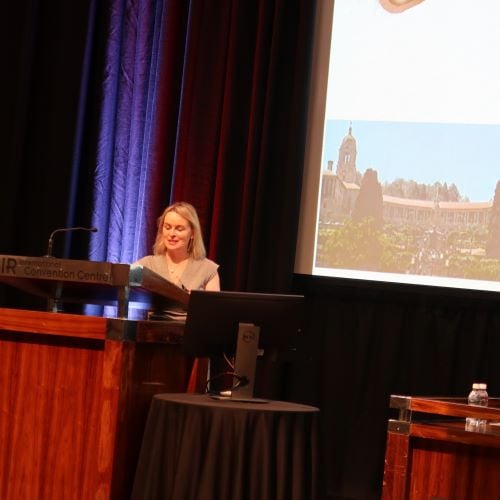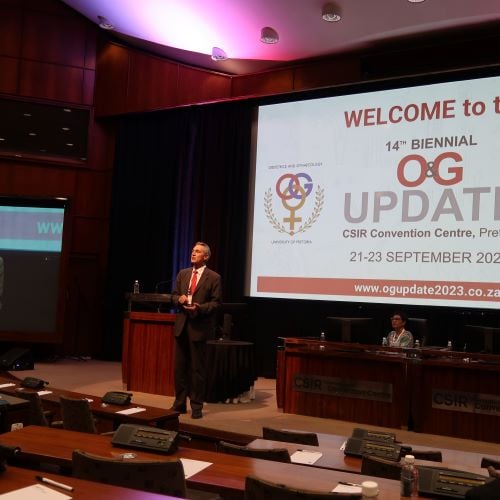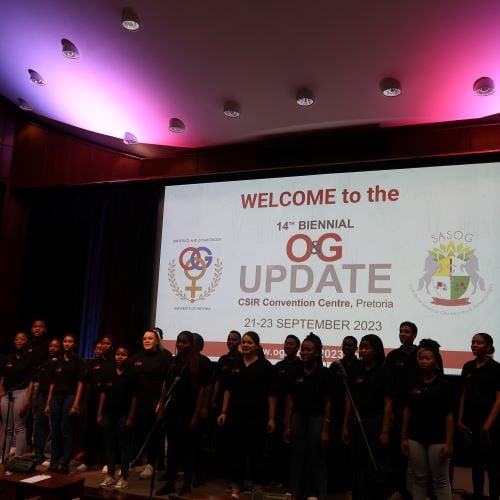UP’s 14th Biennial O&G Update Shines Spotlight on Global Expertise in Obstetrics and Gynaecology
The Department of Obstetrics and Gynaecology in the Faculty of Health Sciences at the University of Pretoria, in collaboration with the South African Society of Obstetricians and Gynaecologists, successfully hosted the 14th Biennial O&G Update at the CSIR Convention Centre from 21 to 23 September 2023. This congress brought together leading experts in the field of obstetrics and gynaecology to address recent advances and controversies in the discipline, sharing groundbreaking insights and innovations.

Professor Fionnuala McAuliffe, Professor of Obstetrics and Gynaecology at National Maternity Hospital Dublin.
Renowned international figures from the world of obstetrics and gynaecology graced the event with their expertise. One such expert was Professor Fionnuala McAuliffe, a trailblazer in obstetrics and gynaecology, hailing from the National Maternity Hospital Dublin. Prof McAuliffe, who also presides as the Head of Women’s and Child’s Health at University College Dublin, and directs the UCD Perinatal Research Centre, captivated the audience with her insights into clinically relevant pregnancy research. Prof McAuliffe began her talk by emphasising the importance of maternal health in preventing chronic diseases.
“Pregnancy serves as a unique window of opportunity for managing long-term health outcomes for both mothers and babies,” she said.
The central focus of her presentation was the FIGO Pregnancy Passport, a groundbreaking tool she and her team developed to revolutionise postpartum care. This passport aims to bridge the gap between mothers and healthcare providers, empowering women to take charge of their health journey after experiencing pregnancy complications.
“The FIGO Pregnancy Passport empowers women to take charge of their health journey after experiencing pregnancy complications.”
The passport, elegantly simple yet profoundly impactful, encourages women to furnish vital information about their backgrounds, encompassing family history, cardiovascular health and diabetes. It also prompts them to disclose any complications they encountered during their index pregnancy. Notably, the passport equips women with an awareness of their elevated risks, motivating them to adopt proactive measures to mitigate these vulnerabilities.
“This knowledge empowers women to recognise their vulnerabilities and motivates them to take proactive steps to reduce those risks.”
Prof McAuliffe underscored the importance of risk-reduction strategies, including adopting a healthy diet, engaging in regular exercise and the pivotal role of breastfeeding. She expressed her eagerness to launch the FIGO Pregnancy Passport widely and collaborate with UP’s Professor Sumaiya Adam from the Department of Obstetrics and Gynaecology to trial this innovative tool in their population.
Another expert gracing the congress was Professor Kim Thornton, Director of the Division of Reproductive Endocrinology and Infertility at the Beth Israel Deaconess Medical Center and Harvard University.
“Pregnancy is much more challenging in women who are older than in women who are younger,” she noted.
Prof Thornton, drawing from over three decades of experience as a reproductive endocrinologist at Boston IVF, shed light on the challenges and innovations in fertility treatment for older women.
Reproductive aging, as elucidated by Prof Thornton, exacts a toll on the quantity and quality of eggs, with ovaries gradually depleting their egg reserves over time. Mitochondrial dysfunction, crucial for egg maturation and embryo development, deteriorates with age, contributing to diminished egg quality.
In response to these challenges, fertility specialists like Prof Thornton have explored innovative stimulation protocols. Such as the Estrogen Priming Protocol and the Microdosing Priming Protocol.

Professor Judith Goh enriched the congress with her insights into urogynaecological mesh removal
Professor Judith Goh, a distinguished urogynaecologist from Brisbane, Australia, enriched the congress with her insights into urogynaecological mesh removal.
“A thorough review of patients’ medical history, especially any symptoms or complications related to the mesh, is vital in understanding the extent of mesh-related issues,” she said.
She emphasised the critical importance of comprehensive assessment before mesh removal, involving a thorough review of patients’ medical history and physical examinations. Her work at the Old Pelvic Mesh Service at the Gold Coast added invaluable depth to the discussions.

Prof Nicholas Crisp sharing insights and expertise on Universal Health Coverage
Public health specialist and honorary professor in public health medicine at the University of Pretoria Professor Nicholas Crisp voiced the urgent need for reform in South Africa’s healthcare system.
“We must act now to ensure that every South African receives the care they need without financial hardship.”
He highlighted the escalating healthcare costs and growing inequalities, especially the disparities between public and private healthcare. Prof Crisp articulated the potential for the National Health Insurance (NHI) plan to enhance maternal healthcare through standardised guidelines and improved data integration, offering hope for healthier pregnancies and reduced maternal mortality rates.

The FHS Choir graced day two’s conclucion with harmonious melodies

